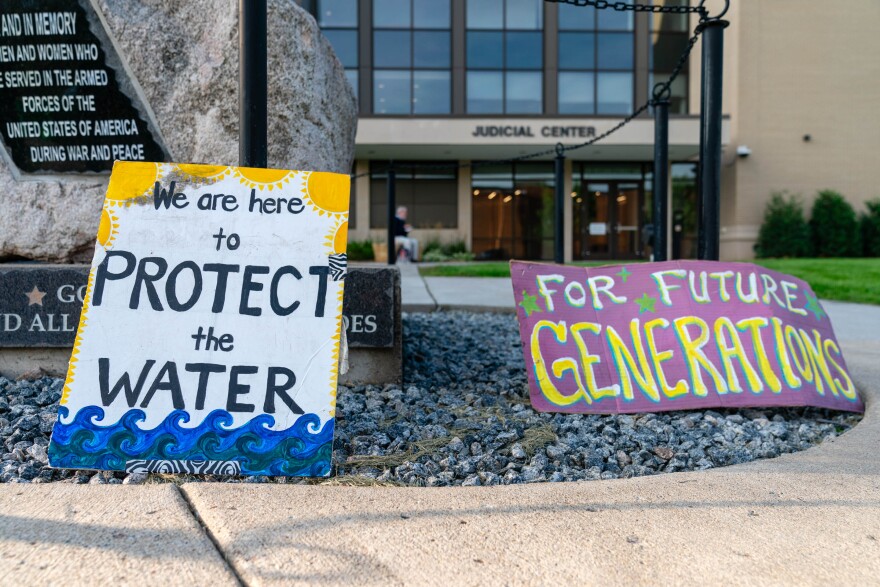ST. PAUL — The Minnesota Court of Appeals reversed the 2023 felony conviction of an Enbridge Line 3 protester, citing at least five instances of misconduct by the Aitkin County prosecutor during her trial.
The appeals court issued its nonprecedential ruling Monday, Aug. 18, nearly two years after a jury convicted Mylene Vialard of obstruction of justice for her role in a 2021 protest at the company’s Swatara pumping station. Vialard, now 56 years old, was one of two people who attached themselves to a self-supporting bamboo structure in the driveway. She was sentenced to one year of unsupervised probation.
The court opined that Vialard failed to receive a fair trial because of “a pattern of unusually serious misconduct” by Garrett Slyva, former assistant Aitkin County attorney. The appeals court remanded the case back to the district court for a new trial.
Assistant Attorney General Ed Stockmeyer, who represented the state in the appeal, conceded to five of the more than 20 instances of misconduct alleged by Vialard’s defense attorneys in the case. This included several statements that could have led the jury to be prejudiced against Vialard, a woman with a French accent who came from Boulder, Colorado, to support the efforts of Indigenous people to protect water from the potential impacts of an oil pipeline.
“The state’s evidence against Vialard was not particularly strong, the misconduct was pervasive, and the district court’s instructions did not cure any prejudicial effect of the misconduct [on the jury],” the opinion states. “On this record, we cannot say that the guilty verdict was surely unattributable to the prosecutor’s misconduct.”

Attorney Claire Glenn is a trial lawyer who works with the Climate Defense Project. She defended Vialard during the trial and the appeal.
“We’re very happy with the outcome overall,” Glenn said by phone Monday. “This whole judicial system is supposed to be about accountability, but that often does not extend to prosecutors themselves. ... We felt this case involved some pretty egregious and pervasive misconduct, so we’re really glad that the Court of Appeals recognized that, and you know, the fight will continue on.”
The Aitkin County Attorney’s Office did not return a request for comment.
In an emailed statement, Vialard wrote that while she’s glad about the outcome of her case, the fight against Enbridge continues.
“The disregard for the territories and rights of the Anishinaabe people and the paid-for-by-Enbridge police violence against them and their allies is an issue that has yet to be addressed by the justice system,” Vialard stated. “In the meantime, Enbridge continues to do harm by extending Line 3 into Line 5 and going from Minnesota to Wisconsin, threatening the Great Lakes region.”
At least four aquifer breaches caused by Line 3 construction were identified, including one in 2023 near the site of the Swatara protest. The company was fined $3.3 million by the Minnesota Department of Natural Resources in 2021 because of a breach near Clearbrook.
This is the second Aitkin County case against a Line 3 protester reversed by the state appeals court this year. In March, it found the state failed to provide sufficient evidence to charge 59-year-old Marian Shaw Moore of Minneapolis with trespassing and unlawful assembly crimes after she participated in a 2021 prayer ceremony at a construction site. In that case, the state did not file a brief or otherwise participate in the appeal to defend its actions.
What happened in the courtroom
Glenn said the state's admission to prosecutorial misconduct is unusual.
“We were actually quite surprised,” Glenn said. “ ... At the same time, they really didn’t have much of a leg to stand on. I think it’s more a testament to how egregious the misconduct was at the trial level.”
Of the misconduct conceded to by the state, two instances came while Slyva examined state witnesses on the stand. Three more were during the prosecution’s closing arguments.
The appeals court identified statements made by Slyva in the closing arguments as “more serious prosecutorial misconduct.” Slyva suggested to the jury that Vialard would have pleaded differently, if the state’s video evidence had been better.
According to the opinion, Slyva told the jury he was ‘“not at liberty to discuss whether or not this case would be taken to trial” if better body-camera footage existed, intentionally implying that such footage would have forced Vialard to plead guilty.”

He also told the jury that Sheriff Dan Guida — one of the state’s witnesses — was elected to protect “our community,” which served to align himself and the sheriff with the jury. And he told them they could “draw reasonable inferences off of what’s not in evidence.”
The appeals court noted that it’s well established that prosecutors cannot make arguments that are not supported by the evidence introduced as part of the case.
“It is extremely troubling that the prosecutor made explicit arguments during the state’s closing and rebuttal encouraging the jury to base its verdict on facts outside the record. Indeed, the state concedes that ‘there is no defense’ for these comments,” the opinion stated.
Vialard’s attorneys objected to each of these instances, but Senior Judge Douglas P. Anderson instructed them to withhold their objections until the closing statement was complete and did not address them until the jury was already deliberating.
Slyva also attempted to bolster a sheriff’s sergeant’s testimony by asking him about his lack of ethical violations and asked another sheriff’s sergeant about injuries he suffered during the protest that were not related to Vialard.
“The five instances of conceded misconduct in this case were part of the prosecutor’s apparent strategy of bolstering the state’s law-enforcement witnesses while appealing to the jury’s potential biases against Vialard,” the ruling stated.
“We need not look further than the prosecutor’s statement to the judge — in the presence of the jury — that his irrelevant question about a sergeant’s ethical violations was meant to ‘further validate’ the sergeant’s testimony. The prejudicial effects of the prosecutor attempting to bolster the state’s witnesses and introduce inadmissible evidence were amplified by the prosecutor’s statement in closing that the sheriff was elected to protect ‘our community.’”
In a footnote, the court also stated its ruling was based on only those instances of misconduct conceded to by the state, but “we note that many of the other alleged instances of prosecutorial misconduct raise serious concerns.”

Previous misconduct
In 2024, Slyva was suspended by the Minnesota Supreme Court following disciplinary action in North Dakota over unrelated professional misconduct. The discipline in North Dakota stemmed from the complaint of a client while Slyva worked for the Fargo Public Defender’s Office between 2021 and 2022.
According to the victim's testimony, Slyva asked her out on a date during an in-person visit at the Cass County Jail in Fargo. He also told the client the conversation should stay between them because he controlled her court date.
The public defender’s office fired Slyva in 2022 after the allegations came to light. The North Dakota Supreme Court reprimanded Slyva for the conduct in October 2023, while he served as an assistant county attorney in Aitkin County.
Slyva briefly worked as an assistant county attorney in Blue Earth County after his employment in Aitkin County ended. He most recently appeared in Minnesota court records as a public defender in Blue Earth in May of this year.
-
The KAXE Music Team highlights new music from Buck Meek, Lala Lala, Mariachi El Bronx, The Womack Sisters, Margo Price, Valerie June, Bella Litsa, Anjimile, and Mexican Institute of Sound with Meridian Brothers.
-
In “Sea of Grass,” Dave Hage and Josephine Marcotty dig into the history, science and future of the North American Prairie — painting a vivid portrait of this diverse, but disappearing ecosystem.
-
-
Bemidji Area Boys and Girls Club launched an after-school site at J.W. Smith in 2023, and with the proposed closure of the school, program leaders and parents share their concerns.
-
And: Walz releases anti-fraud package after Trump administration announces Minnesota Medicaid cuts; Rachel Anthony murder still unsolved after 25 years; Staples-Motley are state wrestling champs.
-
The Boys and Girls Club of Bemidji Area operates a branch at J.W. Smith. Families and staff are concerned about the future of the grant-funded program if the school closes.
-
Darrin Smedsmo's vintage aircraft was impounded following an emergency landing within the Red Lake Nation in October 2025, and he is still waiting for a day in tribal court.
-
-
After a lot of thought and consideration, Grand Rapids Riverfest will take a break this year. This pause reflects KAXE’s financial realities and the complexities of putting on an event of this scale.
-
The package has 18 proposals, including prohibiting legislators from making direct appropriations to nonprofits and establishing a centralized Office of Inspector General.



















